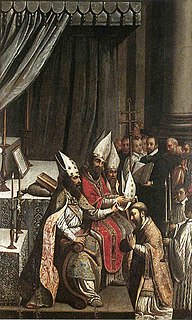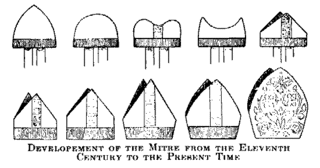
Apostolic succession is the method whereby the ministry of the Christian Church is held to be derived from the apostles by a continuous succession, which has usually been associated with a claim that the succession is through a series of bishops. Christians of the Roman Catholic, Eastern Orthodox, Oriental Orthodox, Old Catholic, Moravian, Hussite, Anglican, Church of the East, and Scandinavian Lutheran traditions maintain that "a bishop cannot have regular or valid orders unless he has been consecrated in this apostolic succession". Each of these groups does not necessarily consider consecration of the other groups as valid.

The word Catholic comes from the Greek phrase καθόλου katholou 'on the whole, according to the whole, in general', and is a combination of the Greek words κατά 'about' and ὅλος 'whole'. The first use of "Catholic" was by the church father Saint Ignatius of Antioch in his Letter to the Smyrnaeans. In the context of Christian ecclesiology, it has a rich history and several usages.

An episcopal polity is a hierarchical form of church governance in which the chief local authorities are called bishops. It is the structure used by many of the major Christian Churches and denominations, such as the Catholic, Eastern Orthodox, Oriental Orthodox, Church of the East, Anglican, and Lutheran churches or denominations, and other churches founded independently from these lineages.

Anglo-Catholicism, Anglican Catholicism, or Catholic Anglicanism comprises people, beliefs and practices within Anglicanism that emphasise the Catholic heritage and identity of the various Anglican churches.
Full communion is a communion or relationship of full agreement among different Christian denominations that share certain essential principles of Christian theology. Views vary among denominations on exactly what constitutes full communion, but typically when two or more denominations are in full communion it enables services and celebrations, such as the Eucharist, to be shared among congregants or clergy of any of them with the full approval of each.

The Eastern Catholic Churches or Oriental Catholic Churches, also called the Eastern-rite Catholic Churches, Eastern Rite Catholicism, or simply the Eastern Churches, are twenty-three Eastern Christian sui iuris (autonomous) particular churches of the Catholic Church, in full communion with the Pope in Rome. Although they are distinct theologically, liturgically, and historically from the Latin Church, they are all in full communion with it and with each other.

The term exarch comes from the Ancient Greek ἔξαρχος, exarchos, and designates holders of various historical offices, some of them being political or military and others being ecclesiastical.

Christian Church is an ecclesiological term referring to what different Christian denominations conceive of as being the true body of Christians or the original institution established by Jesus. It has been used in academia as a synonym for Christianity as well.

A Christian denomination is a distinct religious body within Christianity that comprises all church congregations of the same kind, identifiable by traits such as a name, peculiar history, organization, leadership, theological doctrine, worship style and sometimes a founder. It is a secular and neutral term, generally used to denote any established Christian church. Unlike a cult or sect, a denomination is usually seen as part of the Christian religious mainstream. Most Christian denominations self-describe as Churches, whereas some newer ones tend to use the terms churches, assemblies, fellowships, etc., interchangeably. Divisions between one group and another are defined by authority and doctrine; issues such as the nature of Jesus, the authority of apostolic succession, biblical hermeneutics, theology, ecclesiology, eschatology, and papal primacy may separate one denomination from another. Groups of denominations—often sharing broadly similar beliefs, practices, and historical ties—are sometimes known as "branches of Christianity". These branches differ in many ways, especially through differences in practices and belief.
Independent Catholicism is a independent sacramental movement of clergy and laity who self-identify as Catholic and form "micro-churches claiming apostolic succession and valid sacraments", in spite of not being affiliated to the historic Catholic churches such as the Roman Catholic and Utrechter Old Catholic churches. The term "Independent Catholic" derives from the fact that "these denominations affirm both their belonging to the Catholic tradition as well as their independence from Rome."

Catholicity is a concept pertaining to beliefs and practices widely accepted across numerous Christian denominations, most notably those that describe themselves as Catholic in accordance with the Four Marks of the Church, as expressed in the Nicene Creed of the First Council of Constantinople in 381: "[I believe] in one, holy, catholic, and apostolic Church."

The Ethiopian Catholic Church is a metropolitan sui iuris Eastern particular church within the Catholic Church, established in 1930 in Ethiopia.

Branch theory is an ecclesiological proposition that the One, Holy, Catholic, and Apostolic Church includes various Christian denominations whether in formal communion or not. The theory is often incorporated in the Protestant notion of an invisible Christian Church structure binding them together.
A schism is a division between people, usually belonging to an organization, movement, or religious denomination. The word is most frequently applied to a split in what had previously been a single religious body, such as the Great East–West Schism or the Western Schism. It is also used of a split within a non-religious organization or movement or, more broadly, of a separation between two or more people, be it brothers, friends, lovers, etc.
Maximos IV Sayegh was Patriarch of Antioch and All the East, and Alexandria and Jerusalem of the Melkite Greek Catholic Church from 1947 until his death in 1967. One of the fathers of Second Vatican Council, the outspoken patriarch stirred the Council by urging reconciliation between the Catholic and Eastern Orthodox churches. He accepted the title of cardinal in 1965 after Pope Paul VI clarified the significance of that title in the case of an Eastern Patriarch.

Roman Catholic is a term sometimes used to differentiate members of the Catholic Church in full communion with the pope in Rome from other Christians who also self-identify as "Catholic". It is also sometimes used to differentiate adherents to the Latin Church and its Roman rite from other Catholics, i.e. adherents of the Eastern Catholic Churches of various Eastern rites. It is not the official name preferred by the Holy See or bishops in full communion with the pope as a designation for their faith or institution.
Catholic Apostolic Church may refer to:








